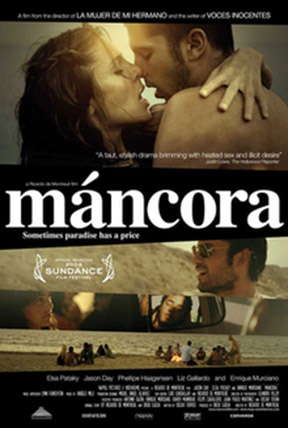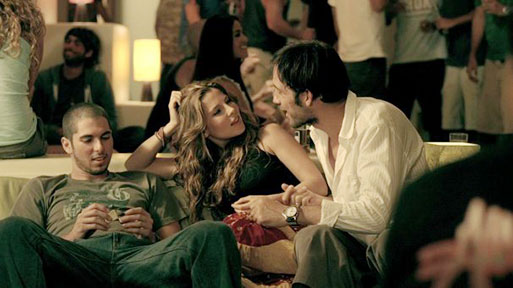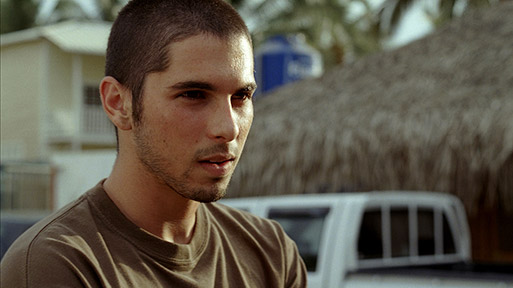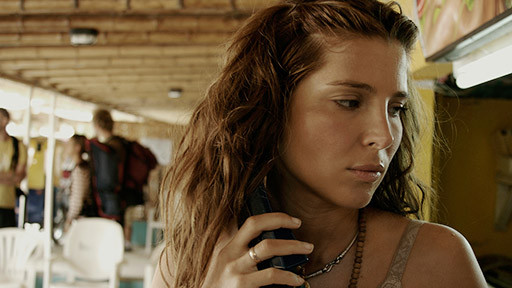Mancora 2008
This was the official website for the 2008 drama/ romance film, Mancora.
Content is from the site's archived pages as well as from other outside sources.
Mancora (2008) Trailer
MÃNCORA introduces us to Santiago (Jason Day), a young Lima rebel who after the death of his father, tormented by his demons and his hatred of the world in general, decides to escape the harsh winter of Lima to take refuge in Mancora, a beach to the north of Peru where it is always summer. Just before his departure, Santiago receives the unexpected visit of his step-sister Ximena (Elsa Pataky), an exuberant and sexy Spanish photographer and her husband, Inigo (Enrique Murciano), an art collector from New York. During the trip Santiago and Ximena seek refuge in each other which makes Inigo jealous and the tranquility of his escape is quickly destroyed by a trespass of borders and betrayal, which threatens to transform their relationship forever and turn Mancora into a lost paradise
Mancora is a gorgeous film, set in one of my favorite places. I also appreciated that Spanish is the language, since it all makes much more sense when the culture is included. I'm not usually into rom coms, and this one had way too much drugs, sex and unexplained violence for comfort. Although I'm an advocate of rewatching great films, since I tend to miss stuff on the first pass, I would never watch this film again. Jennine Forte
REVIEWS
 Review by Neil Pedley on June 15th, 2009
Review by Neil Pedley on June 15th, 2009
CAVEMEN, MOBSTERS AND NAZI ZOMBIES
Having finally managed to achieve a level of commercial clout to marry with its longstanding artistic sensibility, Latin American cinema is as prominent as its ever been, but still lopsided on the world stage towards the big three countries of Mexico, Brazil and Argentina. Here flying the flag for his oft-overlooked home nation is Peruvian director Ricardo de Montreuil with his sophomore feature, an introspective drama set against the backdrop of an arduous journey to a paradise beach. The film stars Jason Day as Santiago, a troubled youth who, in the wake of his father's suicide, finds himself drawn to his stepsister Ximena (Elsa Pataky), much to the chagrin of her husband (Enrique Murciano).
In Spanish with subtitles.
Opens in Los Angeles.
+++
**** ½ Review by Simone
Mancora
2008 Directed by Ricardo de Montreuil
Ricardo de Montreuil's Mancora reminds me a lot of Jacques Audiard's films. The cinematography is breathtakingly beautiful, with the camera sort of gliding around in an effortless and graceful manner. He cast some ridiculously attractive leads, especially Elsa Pataky. You've got an introverted, quiet male lead who seems to just accept life as it comes to him with very few questions asked. The atmosphere is mostly serene with more exciting moments punctuating carefully observed character interactions. It's a vibrant film to experience, even though it doesn't say or do much beyond introducing us to some characters and messing with their relationships.
Santiago (Jason Day) is a young and immature 21-year old kid who has just learned that his father committed suicide. His older (ex)step-sister Ximena decides to visit him after she hears the news, and brings her annoying, selfish, and impulsive husband along. The three of them go on a road trip to escape the harsh winter of Lima, Peru by traveling to Mancora, a beach town up north. Like I mentioned before, Santi just takes life as it comes, experiencing the occasional violent outburst when provoked and attracting female attention without trying. If a girl comes onto him he isn't going to turn her away even if the negative consequences should be glaringly obvious. Xime seems to be on a mission to change her life and therefore makes her bad decisions more deliberately. The relationship with her husband is broken and she knows it and they both seem okay with hurting each other.

Despite the exploration of themes including betrayal, making mistakes, coming of age, and guilt, the film doesn't really hit me in the feels. This isn't the kind of film that gets me super invested and emotionally attached to any one character, but it's all so human that I don't need to cry to enjoy it. It's a comfortable and immensely enjoyable watch, one that doesn't really challenge the viewer even if the characters are put through their paces.
+++
***Review by Stella
Mancora
For the first hour, Máncora feels like a Film Movement film, all very slow, more about characters than plot, with geographical locations playing a substantial role. The kind of film I love. I thought it would be the perfect antidote to a very hectic week getting all the plans in place for my sister's surprise baby shower at a friend's restaurant. The restaurant was going to be closed for five weeks for a renovation. I was able to use the space the weekend before all the work would begin. However, at the last moment I realized I really needed to order extra paper products such as wholesale paper towels, plates, cups, tissues and toilet paper. Luckily my friend suggested the e commerce site where the restaurant buys all their janitorial supplies since they would be able to make a speedy delivery. I could use the restaurant's account to get a break on prices. It turns out the site also sells retail and I have used them ever since for my own paper product needs and cleaning supplies. The surprise party was a big success. And now that it is over I needed some quiet down time. This evening it is a glass (or two) of wine, some of the left overs from the party to nibble, and the film, Máncora.
Because there is very little plot other than road trip and a bit illicit sex here and there, the focus is very much on the three main characters. They didn't have all that much in common but they are all connected through marriage. Santiago, the main protagonist, is the beautiful Ximena's half brother or step-brother, I'm not too clear on which. Santiago and Ximena are close, but just how close we don't know. Nor does Ximena's husband, the New York Gringo. When Santiago parents die, his sister and her husband come visit. But Santiago has already made plans to visit Máncora, which turns into a road trip for the three of them.
The scenery on the way to and in Máncora is beautiful. The camera loves the desert-like landscapes by the water as much as it loves the small Peruvian towns they pass along the way. The film to this point is carried by the characters and the landscapes. I was really enjoying the film. Once they arrive in Máncora, though, the film took a turn which lost my attention.

The last half hour is full of parties and drugs and sexual encounters, followed by yet more parties and more drugs and more sexual encounters. These frenetic going ons , I didn't need. The film begins with one of the final scenes, where Santiago is getting beat up and thrown into the water. I found myself eagerly awaiting the scene, hoping he would get beat up already. Not because I lost interest in the characters but because the scenes of the second half of the film were all too busy and rushed. I had just gone through a week of too busy and rushed. I missed the slower tempo of the first hour. It was a great ride for the first hour though. I just wish they had never made it to Máncora.
+++
Rating: R (for some strong sexual content, drug use, language and violence)
Genre: Art House & International, Drama
Directed By: Ricardo de Montreuil
Written By: Angel Ibarguren, Juan Luis Nugent, Oscar Orlando Torres
In Theaters: Jan 20, 2008 wide
On Disc/Streaming: Jan 12, 2010
Runtime: 100 minutes
Studio: Maya Releasing
TOMATOMETER CRITICS 33% | AUDIENCE 49%

June 18, 2009 |
Nicolas Rapold L.A. Weekly Top Critic
MANCORA Largely set in Peruvian beach towns, Ricardo de Montreuil's titillating road movie follows party kid Santi (Jason Day) on a vacation from reality after his ex-pop star father commits suicide. Tagging along are his smokin' stepsister Ximena (Elsa Pataky), whom he hasn't seen in ages, and her supercilious husband (Enrique Murciano). Half the film foreshadows incest, mixing in assorted hotties and spats along the way; the other half has yet to be written. Day has the right buzz-cut brooding-little-boy look, but he's missing in action, not that the movie has much to say about the characters anyway. Despite dramatic pretenses, De Montreuil (My Best Friend's Wife) has essentially made a piece of sex-and-sun tourism cinema, allowing viewers to turn off their brains and pretend they're on holiday and in a moody, acrobatic love triangle, too. There's no law against that, but the inelegantly edited film officially goes overboard when he and Santi visit a shaman and take some sweet, mind-detonating ayahuasca. Like the pointless flash-forward that opens the movie with an unexplained beating, the episode suggests filmmakers who have lost the plot - a sensation that the abrupt, unsatisfying ending soon confirms. (Sunset 5; Playhouse 7) (Nicolas Rapold)
**** Jennifer L
June 14, 2010
What can I say? Spanish films rock, and this one definitely applies. Somebody else compared this to "Y Tu Mama Tambien?", and I guess that can be said, though I would definitely state this movie to be a an improvement over the previously mentioned film's bizarre antics. At times, I felt a little unaware as to where this movie was going and what was the point, but overall it was very entertaining and kept your attention. I truly wanted somebody to punch out the husband portrayed in this film-- his character made you wonder how she ever ended up with him.
+++
** Dinuksher W
May 24, 2010
save an extremely hot Elsa Pataky this film wasted my evening (apparently her surname pataky means 'someone who lived near a creek' in Hungarian...phooh...burning)
+++
**** Margara M
January 10, 2010
me gustooo.... las peliÂÂculas peruanas me tienen descrestada!!!
+++
***½ Olga Consuelo S
December 8, 2009
Loved this beautiful stylish film about love, lust and letting go of the past.
Super Reviewer
+++

***½ Ed K
October 5, 2009
Pretty solid all around.
+++
** Isaac B
September 28, 2009
Beautifully shot, gorgeous cast, yet superficial attempt at an imitation of Y Tu Mama Tambien. The ending is about as cliche as it gets.
+++
****½ Mauro F
½ August 12, 2009
Lindo, corram vão ver este filme.
+++
***** Jordan F
June 26, 2008
Wow! visually stunning
+++
***½ Sascha M
January 25, 2008
A road movie set in Peru that takes you from Lima to the lush beaches and international party crowd at the surf town of Mancora. To escape his harsh reality in Lima, Santiago decides to drive to Mancora. He is joined by his artist step sister from New York and her new husband, who is an adrenaline junkie. In the bohemian and anything-goes party town of Mancora they succumb to booze, drugs and sex but are eventually forced to face their personal demons. There is a short episode with the entheogenic/shamanic substance Ayahuasca which I specifically enjoyed. Overall, a beautifully shot coming of age movie with gorgeous actors shot in a country most of us will never travel to, but not much more.
More Background on MancoraFilm.com
"Mancora" is a 2008 Peruvian drama/romance film directed by Ricardo de Montreuil. The film has garnered attention for its unique blend of drama, romance, and cultural exploration set against the backdrop of Peruvian landscapes. This article will delve into the film's background, reviews, cultural significance, and the broader context of its creation and reception.
Background and History of the Film
"Mancora" premiered in 2008, marking a significant moment in Peruvian cinema's international visibility. The film follows Santiago, a young man from Lima, who embarks on a journey to Mancora, a coastal town in northern Peru, after his father's death. He is joined by his step-sister Ximena and her husband, Inigo, leading to a complex exploration of relationships, betrayal, and personal growth.
The film is notable for its cinematography, capturing the stark contrasts between Lima's urban landscape and the vibrant, sun-kissed beaches of Mancora. This visual narrative serves as a metaphor for the characters' inner journeys, as they navigate through their personal demons and desires.
Reviews and Reception
"Mancora" received mixed reviews from critics and audiences. Some praised the film's visually stunning portrayal of Peru's diverse landscapes and the performances of its lead actors, particularly Elsa Pataky as Ximena. However, others found the narrative lacking in depth and the characters somewhat superficial, despite their intriguing dynamics.
Critics noted that the film's themes of betrayal, guilt, and coming of age were not fully explored, leaving viewers somewhat detached from the characters' emotional journeys. The film's reliance on sex, drugs, and party scenes in the latter half was seen as a departure from its initial slow-paced, character-driven narrative, which some viewers found more compelling.
Audiences generally appreciated the film's aesthetic appeal and the chemistry between the leads, but some felt that it did not live up to its potential as a profound drama. Comparisons were drawn with other films like "Y Tu Mamá También," highlighting both similarities in themes and differences in execution.
Press and Media Coverage
"Mancora" garnered attention in the media for its portrayal of Peruvian culture and its contribution to the global visibility of Latin American cinema. The film was discussed in various publications for its unique setting and the way it captured the essence of Peruvian landscapes, from the desert-like coastal regions to the vibrant party scenes in Mancora.
Media coverage also highlighted the film's participation in international film festivals, where it was showcased as part of a broader movement to promote Latin American cinema worldwide. This exposure helped in positioning "Mancora" as a representative of Peruvian storytelling on the global stage.
Audience and Cultural Significance
The film's audience was diverse, appealing to those interested in international cinema, particularly fans of art house and drama films. The cultural significance of "Mancora" lies in its depiction of Peruvian culture and its exploration of universal themes such as family, betrayal, and personal transformation.
For Peruvian audiences, the film offered a reflection of their own cultural identity, showcasing both the beauty of their landscapes and the complexities of their societal dynamics. Internationally, it contributed to a broader understanding of Latin American culture, highlighting the region's rich diversity and creative output.
Known For
"Mancora" is known for its stunning cinematography, capturing the breathtaking landscapes of Peru. The film's use of Spanish as its primary language adds to its cultural authenticity, making it a compelling watch for those interested in international cinema.
The cast, particularly Elsa Pataky, received praise for their performances, bringing depth and charisma to their characters. The film's exploration of complex relationships and personal struggles resonated with audiences looking for character-driven dramas.
Details and Insights
One of the notable aspects of "Mancora" is its setting. The film transitions from the urban grit of Lima to the idyllic beaches of Mancora, symbolizing the characters' escape from reality and their search for solace. This visual transition is not just geographical but also metaphorical, reflecting the characters' inner journeys.
The film's themes of betrayal and guilt are central to its narrative, as the characters navigate their complicated relationships. The tension between Santiago and Ximena, complicated by her marriage to Inigo, forms the core of the film's dramatic conflict.
Examples and Specifics
A specific example of the film's cultural significance is its portrayal of the Peruvian party scene in Mancora. The town is depicted as a vibrant, anything-goes environment where characters can temporarily escape their troubles. This portrayal highlights the cultural importance of such destinations in Peru, where they serve as both tourist attractions and local gathering places.
The film also explores the theme of coming of age through Santiago's character. His journey from a troubled youth in Lima to a more self-aware individual in Mancora is emblematic of the challenges faced by young people in navigating personal crises and finding their place in the world.
"Mancora" is a film that offers a unique blend of drama, romance, and cultural exploration. While it received mixed reviews, its visual appeal and performances were widely praised. The film's cultural significance lies in its portrayal of Peruvian landscapes and its exploration of universal themes that resonate with audiences worldwide.
As a representative of Peruvian cinema, "Mancora" contributed to the global visibility of Latin American storytelling, showcasing the region's rich cultural diversity and creative talent. Despite its limitations, the film remains a notable work in the context of international cinema, offering insights into the complexities of human relationships and personal growth.